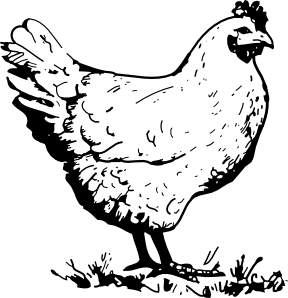Case 15775, released on Friday, April 15th, by the Halifax city planning department, deals with the keeping of urban hens on the Halifax Peninsula. Case 15775 recommends that no action be taken, that current Land-Use Bylaws, which do not allow for agriculture on the Peninsula, stand, and that urban hens be kept off the peninsula.
Central to the issue is one Louise Hanavan. It was Hanavan's keeping of three backyard hens, back in 2008, that prompted the entire debate over whether the Peninsula would welcome poultry. Land-Use Bylaws were, and remain, vague, in that they do not actually mention that one is not allowed to keep chickens, only that the Peninsula is not zoned for agriculture. Hanavan's original three chickens were eventually relocated to the countryside, but her efforts to keep her brood brought national attention to the issue, as well as a groundswell of public support throughout Halifax. Hanavan speaks to Case 15775, and city planning:
“This is their second stab at doing a report. They released another report, (over) two years ago, and it was the result of a petition. There were more than a thousand signatures from people all over Halifax that went to the city council and said 'We want some legislation.'”
While Case 15775 pays lip service to the large-scale public support for the idea of urban hens, and the potential for increased food security, the report balks at rezoning the Land-Use Bylaw. The inaction recommended in the report would seem to hinge on a general fear for the well-keeping of the theoretical hens. Several mentions are made of 'not every owner acting responsibly'. Hannavan claims that the welfare of the chickens would not be a Peninsula problem, so the issue on this level is moot.
“There is an animal welfare act at the provincial level,” says Hanavan, “and it distinguishes between farm animals and companion animals. Companion animals go to the SPCA, and farm animals, which poultry is a part of by their definition, are under provincial jurisdiction. This was not really explored in the report. If there were a problem with a chicken, being mistreated, whether in the city or in the country, provincial law says that that's the responsibility of the provincial inspector. So really, (animal welfare for farm animals) is not a city problem, and the city is making it out to be one.”
According to the Provincial Department of Agriculture, she's right.
“It's the provincial mandate of the Department of Agriculture to look after the care of farm animals.” says Celeste Sulliman, Communications Director for the Department of Agriculture. “Any farm animal falls under the animal protection act.”
So three years later, and Halifax is back where it started: Confused over its own mandates, certainly able to change its vague Land-Use Bylaw, and without any potential regulations in place. Other cities, such as neighbouring Moncton, have undertaken successful pilot projects. Offers to run similar pilot projects in Halifax have been on the table for months.
Pilot projects of this sort would go far to mitigate any of the city's remaining concerns, such as coop size, distance from neighbours, etc. Many world-class cities already allow for the keeping of urban hens, and the sky most certainly has not fallen on them. Feathers are rightly ruffled.
Louise Hanavan asks for all Haligonians to contact their city councillor (again) and urge them to move forward with changing the Land-Use Bylaw, city planning recommendation notwithstanding.



